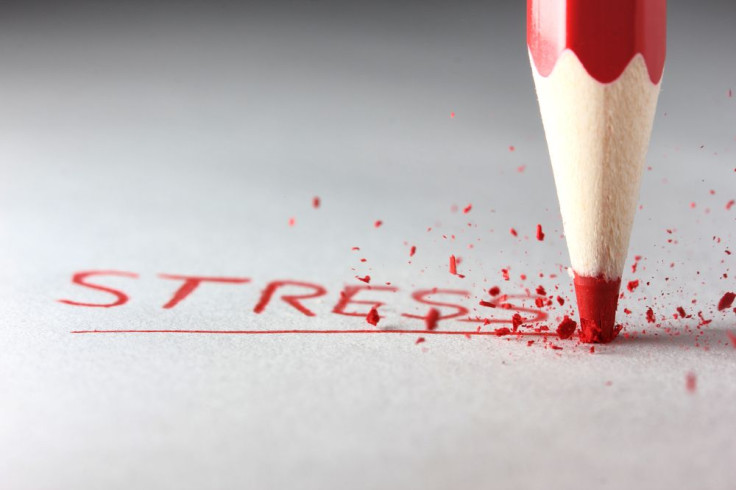Side Effects Of Stress: 5 Things Stress Does And Doesn't Cause

We all deal with it, but not all of us know exactly what it can mean for our health. Stress is as natural a human response as breathing or scratching at an itch. There are a lot of misconceptions surrounding stress and what it can and can’t cause. What many people don’t understand is that not all stress is bad. It could be what saves your life in a dangerous situation. To understand what stress causes, it's best we understand what stress actually is. According to the National Institute of Mental Health, stress is the brain’s response to any demand. It’s when the brain produces too much of that response that we run into problems.
Does
Hair Loss
Many a man has blamed his receding hairline or bold spot on his rambunctious children running amuck and not paying attention. Stress is often indicated as a possible explanation for hair loss, but how can the body’s response to stimuli result in our hair falling out? Alopecia areata (AA) is commonly referred to as stress-induced disease. However, stress’s effect on this condition is a little more complicated. Although stress does not directly lead to AA, stress’s effect on the immune system causes an autoimmune response that attacks hair follicles.
“It affects how your immune system functions, effectively making it go haywire,” Dr. Stacy Banerjee, co-founder and COO of the chronic disease remote monitoring company Salusity, told Medical Daily in an email. “This, it affects your body's ability to defend itself against infection. However, it can also cause autoimmune diseases to act up. This, stress can lead to exacerbations of diseases like Crohn's disease, ulcerative colitis, rheumatoid arthritis, and psoriasis. These changes in your immune system can also affect your body's ability to repair changes in your cells that can be precursors to cancer.”
Acne
Teenage years can be a very stressful time in any person’s life and most people experience one major problem during this time that tends to have a major impact on their appearance: acne. Now, is stress the chicken or the egg in this situation? Acne is the result of overactive oil glands that produce too much oil which plugs pores by combining with skin cells. As pores are plugged, the bacterium P. acnes multiplies, leading to lesions on the skin. What can trigger this immune response? You guessed it: stress.
“Acne results when immune cells hone in on your skin or something in your skin,” Banerjee explained. “Stress can unnecessarily activate your immune system and they can go to your skin, depending on the cells that stress activates in you (it's different for each person), where they can cause irritation and breakouts.”
Heart Attack and Stroke
When faced with a dangerous situation, you may notice your pulse quickening, your breath getting faster, your muscles tensing up, and your brain using more oxygen to increase its activity. These stress responses are aimed toward survival. Unfortunately, as these responses continue under chronic stress they lead to the suppression of our body’s vital systems, including the digestive system, reproductive system, and circulatory system.
“It can affect your heart by forcing it to work harder,” Banerjee added. “Just as physical stress causes your heart to work harder by increasing your muscles' need for oxygen, so can emotional stress by increasing your brain's need for oxygen. Thus, stress can be associated with heart disease. In fact, emotional stress is known to trigger a syndrome called Takotsubo cardiomyopathy.”
Doesn’t
Gray Hair
Yes, stress will lead to hair loss. No, stress will not turn your hair a different color directly, but it can lead to a man developing the silver fox look over time. Marie Antoinette was said to be so stressed out over her impending doom that her entire head of hair turned white the night before her eventual decapitation. While dermatology and hair care experts agree that Antoinette’s hair most likely did not turn gray as she awaited the guillotine overnight, stress could’ve caused her new hair color if she was on death row for a number of years. Research into stress’s effect on gray hair has revealed that normal aging is mainly to blame. According to dermatologists’ 50-50-50 rule, 50 percent of the population has 50 percent gray hair by the time they reach the age of 50.
Ulcers
One out of every 10 Americans develops at least one ulcer during their lifetime. Although lifestyle factors, such as smoking, diet, and stress, have been attributed to ulcer development in the past, research has discovered no link between the two. In fact, 80 percent of all gastric ulcers and 90 percent of all duodenal ulcers develop as a result of being infected with the bacterium Helicobacter pylori (H. pylori). Even though research has shown no relationship between stress and ulcer development, people with ulcers often claim that stress can worsen the pain.
Published by Medicaldaily.com



























